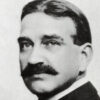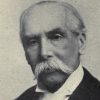We are to have a tiny party here tonight. I hate tiny parties, they force one into constant exertion.
A fine is a bribe paid by a rich man to escape the lawful penalty of his crime. In China such bribes are paid to the judge personally. In America they are paid to him as agent for the public. But it makes no difference to the men who pay them, nor to the men who can’t pay them.
H. L. Mencken (1880-1956) American writer and journalist [Henry Lewis Mencken]
A Little Book in C Major, ch. 4, § 7 (1916)
(Source)
Variants:
FINE. A bribe paid by a rich man to escape the lawful penalty of his crime. In China such bribes are paid to the judge personally; in America they are paid to him as agent for the public. But it makes no difference to the men who pay them -- nor to the men who can't pay them.
[A Book of Burlesques, "The Jazz Webster" (1924)]
Fine -- A bribe paid by a rich man to escape the lawful penalty of his crime. In China such bribes are paid to the judge personally; in America they are paid to him as agent for the public. But it makes no difference to the men who pay them -- nor to the men who can’t pay them.
[Chrestomathy, ch. 30 "Sententiae" (1949)]
The neurotic longs to touch bottom, so at least he won’t have that to worry about anymore.
Mignon McLaughlin (1913-1983) American journalist and author
The Neurotic’s Notebook, ch. 10 (1963)
(Source)
Polygamy may well be held in dread,
Not only as a sin, but as a bore:
Most wise men, with one moderate woman wed,
Will scarcely find philosophy for more.
Death is the liberator of him whom freedom cannot release, the physician of him whom medicine cannot cure, and the comforter of him whom time cannot console.
Charles Caleb "C. C." Colton (1780-1832) English cleric, writer, aphorist
Lacon: Or, Many Things in Few Words, Vol. 2, § 200 (1822)
(Source)
GENEALOGY, n. An account of one’s descent from an ancestor who did not particularly care to trace his own.
Ambrose Bierce (1842-1914?) American writer and journalist
“Genealogy,” The Cynic’s Word Book (1906)
(Source)
Included in The Devil's Dictionary (1911). Originally published in the "Devil's Dictionary" column in the San Francisco Wasp (1885-02-21).
Yes, it is the brightness, not the darkness, that we see when we look back. The sunshine casts no shadows on the past. The road that we have traversed stretches very fair behind us. We see not the sharp stones. We dwell but on the roses by the wayside, and the strong briers that stung us are, to our distant eyes, but gentle tendrils waving in the wind. God be thanked that it is so — that the ever-lengthening chain of memory has only pleasant links, and that the bitterness and sorrow of to-day are smiled at on the morrow.
Jerome K. Jerome (1859-1927) English writer, humorist [Jerome Klapka Jerome]
Idle Thoughts of an Idle Fellow, “On Memory” (1886)
(Source)
First published in Home Chimes (1885-09-26).
BALTHASAR: For slander lives upon succession,
Forever housèd where it gets possession.William Shakespeare (1564-1616) English dramatist and poet
Comedy of Errors, Act 3, sc. 1, l. 154ff (3.1.154-155) (1594)
(Source)
To Antipholus of Ephesus.
Library books were, I suddenly realized, promiscuous, ready to lie in the arms of anyone who asked. Not like bookstore books, which married their purchasers, or were brokered for marriages to others.
The truly conscientious will not limit themselves to helping with the more exciting parts of one’s life. They are also scrupulous about offering helpful suggestions regarding such mundane matters as your household arrangements, work habits, mannerisms, and use of the language. There is nothing like a good friend to help you out when you are not in trouble.
Judith Martin (b. 1938) American author, journalist, etiquette expert [a.k.a. Miss Manners]
Miss Manners’ Guide for the Turn-of-the-Millennium, Part 1 “Revised Conventions,” “Advice” (1989)
(Source)
That is not good language which all understand not.
George Herbert (1593-1633) Welsh priest, orator, poet.
Jacula Prudentum, or Outlandish Proverbs, Sentences, &c. (compiler), # 302 (1640 ed.)
(Source)
Training is everything. The peach was once a bitter almond; cauliflower is nothing but cabbage with a college education.
Mark Twain (1835-1910) American writer [pseud. of Samuel Clemens]
Pudd’nhead Wilson, ch. 5, Epigraph (1894)
(Source)
As far as your self-control goes, as far goes your freedom.
[So weit Deine Selbstbeherrschung geht, so weit geht Deine Freiheit.]
Marie von Ebner-Eschenbach (1830-1916) Austrian writer
Aphorisms [Aphorismen], No. 534 (1880)
(Source)
(Source (German)). Alternate translation:
Freedom stretches as far as your self-control.
[tr. Scrase/Mieder (1994)]
Fear makes evry thing and evry body masters over us; it iz the wust slavery thare iz.
[Fear makes everything and everybody masters over us; it is the worst slavery there is.]
Josh Billings (1818-1885) American humorist, aphorist [pseud. of Henry Wheeler Shaw]
Everybody’s Friend, Or; Josh Billing’s Encyclopedia and Proverbial Philosophy of Wit and Humor, ch. 148 “Affurisms: Ink Brats” (1874)
(Source)
Some of my youthful readers are developing wonderful imaginations. This pleases me. Imagination has brought mankind through the Dark Ages to its present state of civilization. Imagination led Columbus to discover America. Imagination led Franklin to discover electricity. Imagination has given us the steam engine, the telephone, the talking-machine, and the automobile, for these things had to be dreamed of before they became realities. So I believe that dreams — day dreams, you know, with your eyes wide open and your brain machinery whizzing — are likely to lead to the betterment of the world. The imaginative child will become the imaginative man or woman most apt to create, to invent, and therefore to foster civilization. A prominent educator tells me that fairy tales are of untold value in developing imagination in the young. I believe it.
L. Frank Baum (1856-1919) American author [Lyman Frank Baum]
The Lost Princess of Oz, Introduction (1917)
(Source)
Be neither foolishly Bashful, nor nauseously Confident.
Thomas Fuller (1654-1734) English physician, preacher, aphorist, writer
Introductio ad Prudentiam, Vol. 1, # 104 (1725)
(Source)
I believe I drank too much wine last night at Hurstbourne; I know not how else to account for the shaking of my hand today. You will kindly make allowance therefore for any indistinctness of writing, by attributing it to this venial error.
EPIGRAM. A platitude with vine-leaves in its hair.
H. L. Mencken (1880-1956) American writer and journalist [Henry Lewis Mencken]
A Book of Burlesques, “The Jazz Webster” (1924)
(Source)
The poor have the same basic pleasures of the rich, and the rich will always resent it.
Mignon McLaughlin (1913-1983) American journalist and author
The Neurotic’s Notebook, ch. 1 (1963)
(Source)
But I digress: of all appeals, — although
I grant the power of pathos, and of gold,
Of beauty, flattery, threats, a shilling, — no
Method’s more sure at moments to take hold
Of the best feelings of mankind, which grow
More tender, as we every day behold,
Than that all-softening, overpowering knell,
The tocsin of the soul — the dinner-bell.
PERSEUS: O Love, our lord, of gods and men the king.
[σὺ δ’ ὦ θεῶν τύραννε κἀνθρώπων ῎Ερως]
Euripides (485?-406? BC) Greek tragic dramatist
Andromeda [Ανδρομέδα], frag. 136 (TGF) (412 BC)
(Source)
Lucian, in How to Write History, says the people of Abdera, Thrace, were so affected by a mid-summer performance of this play that they stumbled about, bemusedly repeating the the first line, until restored to their senses by a severe winter (see 1, 2, 3).
Nauck frag. 136, Barnes Addenda p519, Musgrave frag. 17. (Source (Greek)). Alternate translations:
Tyrant of Gods, and men, O Love.
[tr. Wodhall (1809)]
You, Eros, tyrant over gods and men.
[tr. Collard/Cropp (2008)]
Lust, you tyrant of gods and men!
[tr. @sentantiq (2015)]
Even so, one step from my grave,
I believe that cruelty, spite,
The powers of darkness will in time
Be crushed by the spirit of light.[Но и так, почти у гроба,
Верю я, придет пора —
Силу подлости и злобы
Одолеет дух добра.]Boris Pasternak (1890-1960) Russian poet, novelist, and literary translator
“Nobel Prize [Нобелевская Премия]” st. 4 (1959) [tr. Stallworthy/France (1982)]
(Source)
On his persecution for winning the 1958 Nobel Prize for Literature for Doctor Zhivago, which had been condemned by the Communist Party and the Soviet government. The poem was not published until Selected Poems (1983).
This upbeat ending is how the poem officially ends. Two more, darker, stanzas were attached to the manuscript by Pasternak, but it is unclear if they were meant to be added (and, if so, where), or if Pasternak ever wanted the poem published.
(Source (Russian)). Alternate translations:
Even now, at the edge of the tomb,
I believe in the virtuous fate, --
And the spirit of goodness will soon
overcome all the malice and hate.
[tr. Kneller]
But even as my grave awaits,
the time will come. I've believed --
The forces of meanness and hate
will be vanquished by the spirit of good.
[tr. Mager]
Yet, as I approach my passing,
I believe the day is near,
When the heart of good surpasses
rage and baseness -- even here.
[tr. Moreton]
Even in my dying hour
I believe it still stronger:
Malice will be overpowered
By the spirit of Good Will.
[tr. Astrakhan]
Arguments are like fire-arms, which a man may keep at home but should not carry about with him.
Samuel Butler (1835-1902) English novelist, satirist, scholar
Note-books, ch. 10 “The Position of a Homo Unius Libri,” “The Art of Propagating Opinion” [ed. Jones (1912)]
(Source)
§ 94. But why should every individual not have been present more than once in this world?
§ 95. Is this hypothesis so ridiculous just because it is the oldest one? Because the human understanding hit up on it at once, before it was distracted and weakened by the sophistry of the schools?
§ 98. Why should I not come back as often as I am able to acquire new knowledge and new accomplishments? Do I take away so much on one occasion that it may not be worth the trouble coming back?
§ 100. Or am I not to return because too much time would be lost in so doing? — Lost? — And what exactly do I have to lose? Is not the whole of eternity mine?[§ 94. Aber warum könnte jeder einzelne Mensch auch nicht mehr als einmal auf dieser Welt vorhanden gewesen seyn?
§ 95. Ist diese Hypothese darum so lächerlich, weil sie die älteste ist? weil der menschliche Verstand, ehe ihn die Sophisterey der Schule zerstreut und geschwächt hatte, sogleich darauf verfiel?
§ 98. Warum sollte ich nicht so oft wiederkommen, als ich neue Kenntnisse, neue Fertigkeiten zu erlangen geschickt bin? Bringe ich auf Einmal so viel weg, daß es der Mühe wieder zu kommen etwa nicht lohnet?
§ 100. Oder, weil so zu viel Zeit für mich verloren gehen würde?—Verloren? —Und was habe ich denn zu versäumen? Ist nicht die ganze Ewigkeit mein?]Gotthold Lessing (1729-1781) German playwright, philosopher, dramaturg, writer
The Education of the Human Race [Die Erziehung des Menschengeschlechts] (1780)
(Source)
(Source (German)). Alternate translations:
§ 94. But why should not every individual man have existed more than once upon this World?
§ 95. Is this hypothesis so laughable merely because it is the oldest? Because the human understanding, before the sophistries of the Schools had dissipated and debilitated it, lighted upon it at once?
§ 98. Why should I not come back as often as I am capable of acquiring fresh knowledge, fresh expertness? Do I bring away so much from once, that there is nothing to repay the trouble of coming back?
§ 100. Or is it a reason against the hypothesis that so much time would have been lost to me? Lost? -- And how much then should I miss? -- Is not a whole Eternity mine?
[tr. Robertson (1862)]
§ 94. But why could not each individual man Have been existent on this earth more than once?
§ 95. Is this hypothesis therefore so absurd because it is the oldest, because the human understanding, ere enfeebled and scattered by sophistry, immediately hit upon it?
§ 98. Why may I not return as often as I am fit to acquire new knowledge, new skill? Do I bring away so much at once that there is not wherewith to recompense the burden of return?
§ 100. Or is it because too much time would thus for me be lost? Lost? And what have I to lose? Is not mine a whole eternity?
[tr. Haney (1908)]
We should keep silent about those in power; to speak well of them almost implies flattery; to speak ill of them while they are alive is dangerous, and when they are dead is cowardly.
[L’on doit se taire sur les puissants: il y a presque toujours de la flatterie à en dire du bien; il y a du péril à en dire du mal pendant qu’ils vivent, et de la lâcheté quand ils sont morts.]
Jean de La Bruyère (1645-1696) French essayist, moralist
The Characters [Les Caractères], ch. 9 “Of the Great [Des Grands],” § 56 (9.56) (1688) [tr. Stewart (1970)]
(Source)
(Source (French)). Alternate translations:
The less we talk of the powerful, the better; what we say good of them, is often flattery: 'Tis dangerous to speak ill of 'em while they live, and villainous when they are dead.
[Bullord ed. (1696)]
The less we talk of the Great and Powerful, the better; what good we say of them is often Flattery 'Tis dangerous to speak ill of them while they are alive, and villainous when dead.
[Curll ed. (1713)]
The less we talk of the Great and Powerful, the better; what good we say of them is often Flattery: It is dangerous to speak of of them while living, it is base to insult over them when dead.
[Browne ed. (1752)]
The less we talk of the great and powerful the better; if we say any good of them, it is often almost flattery; it is dangerous to speak ill of them whilst they are alive, and cowardly when they are dead.
[tr. Van Laun (1885)]
FUTURE, n. That period of time in which our affairs prosper, our friends are true, and our happiness is assured.
Ambrose Bierce (1842-1914?) American writer and journalist
“Future,” The Cynic’s Word Book (1906)
(Source)
Included in The Devil's Dictionary (1911). Originally published in the "Devil's Dictionary" column in the San Francisco Wasp (1885-02-21).
Study has always been for me the sovereign remedy against life’s unpleasantness, since I have never experienced any sorrow that an hour’s reading did not eliminate.
[L’étude a été pour moi le souverain remède contre les dégoûts de la vie, n’ayant jamais eu de chagrin qu’une heure de lecture n’ait dissipé.]
Charles-Lewis de Secondat, Baron de Montesquieu (1689-1755) French political philosopher
Pensées [Thoughts], # 213 (1720-1755) [tr. Clark (2012)]
(Source)
(Source (French)). Alternate translations:
Study has been my sovereign remedy against the worries of life. I have never had a care that an hour's reading could not dispel.
[Source (1826)]
Study is a sovereign remedy against the troubles of life; there is no vexation which an hour's reading cannot mitigate.
[E.g. (1877)]
Study has been to me a sovereign remedy against the vexations of life, having never had an annoyance that one hour's reading did not dissipate.
[E.g. (1905)]
Study has been my sovereign remedy against life's disappointment; I have never known any distress that an hour's reading did not relieve.
[ed. Guterman (1963)]
Poverty wants some things, Luxury many things, Avarice all things.
Benjamin Franklin (1706-1790) American statesman, scientist, philosopher, aphorist
Poor Richard (1735 ed.)
(Source)
Indeed, the labor of keeping house is labor in its most naked state, for labor is toil that never finishes, toil that has to be begun again the moment it is completed, toil that is destroyed and consumed by the life process.
Mary McCarthy (1912-1989) American author, critic, political activist
“The Vita Activa,” The New Yorker (1958-10)
(Source)
A review of Hanna Arendt, The Human Condition (1958). Collected in On the Contrary: Articles of Belief, 1946–1961, Part 1 (1961).
It is so hard for us little human beings to accept this deal that we get. It’s really crazy, isn’t it? We get to live, then we have to die. What we put into every moment is all we have.
The idea that people can behave naturally, without resorting to an artificial code tacitly agreed upon by their society, is as silly as the idea that they can communicate by a spoken language without commonly accepted semantic and grammatical rules.
Judith Martin (b. 1938) American author, journalist, etiquette expert [a.k.a. Miss Manners]
Common Courtesy, “On Etiquette as Language, Weapon, Custom, and Craft” (1985)
(Source)
The best mirrour is an old friend.
George Herbert (1593-1633) Welsh priest, orator, poet.
Jacula Prudentum, or Outlandish Proverbs, Sentences, &c. (compiler), # 296 (1640 ed.)
(Source)
A little knowledge is said to be a dangerous thing, but it is not dangerous to the imagination. Knowledge is to the imagination what fuel is to flame. A little feeds it; a great deal extinguishes it.
I have always believed that the key to a happy marriage was the ability to say with a straight face, “Why, I don’t know what you’re worrying about. I thought you were very funny last night, and I’m sure everybody else did, too.”
Judith Martin (b. 1938) American author, journalist, etiquette expert [a.k.a. Miss Manners]
Common Courtesy, “Those Who Would Change the Country’s Manners Encounter Citizen Resistance” (1985)
(Source)
I can recollect nothing more to say at present; perhaps breakfast may assist my ideas.
I was deceived — my breakfast supplied only two ideas — that the rolls were good and the butter bad.
The neurotic doesn’t know how to cope with his emotional bills; some he keeps paying over and over, others he never pays at all.
Mignon McLaughlin (1913-1983) American journalist and author
The Neurotic’s Notebook, ch. 9 (1963)
(Source)
There’s not a sea the passenger e’er pukes in,
Turns up more dangerous breakers than the Euxine.George Gordon, Lord Byron (1788-1824) English poet
Don Juan, Canto 5, st. 5 (1821)
(Source)
The Euxine is the Black Sea, from the Greek Pontos Euxeinos, which means (ironically) "the hospitable sea."
It is a rich, full-bodied whistle,
cracked ice crunching in pails,
the night that numbs the leaf,
the duel of two nightingales,
the sweet pea that has run wild,
Creation’s tears in shoulder blades.[Это – круто налившийся свист,
Это – щелканье сдавленных льдинок,
Это – ночь, леденящая лист,
Это – двух соловьев поединок.
Это – сладкий заглохший горох,
Это – слезы вселенной в лопатках.]Boris Pasternak (1890-1960) Russian poet, novelist, and literary translator
“Definition of Poetry [Определение поэзии],” ll. 1-6, My Sister — Life [сестра моя – жизнь] (1922)
(Source)
This is the translation, source unknown, given in Pasternak's obituary, "Farewell in a Poet's Land," Life Magazine (1960-06-13), and frequently quoted from there.
Alternate translations:
It's a tightly filled whistle,
it's the squeaking of jostled ice,
it's night, frosting the leaves,
it's two nightingales dueling.
It's the soundlessness of sweetpeas,
the tears of the universe in a pod.
[tr. Rudman/Boychuk (1983)]
It's a whistle that howls in the veins,
It's the crackle of ice under pressure,
It's the leaf-chilling night in the rain,
It's two nightingales dueling together.
It's the sweet pea all choked in the fields,
It's the universe weeping in pea pods.
[tr. Falen (2012)]
It’s a whistle, acutely full,
It’s a crackle of squeezed ice,
It’s night, freezing a leaf,
It’s two nightingales in a duel.
It’s the sweet grown-wildness of peas,
It’s tears of the universe in pods.
[tr. Livingstone (2015)]
It's a whistle blown ripe in a trice,
It's the cracking of ice in a gale,
It's a night that turns green leaves to ice,
It's a duel of two nightingales.
It is sweet-peas run gloriously wild,
It's the world's twinkling tears in the pod.
[Source]
We moderns do not believe in demigods, but our smallest hero we expect to feel and act as a demigod.
[Wir Neuern glauben keine Halbgötter, aber der geringste Held soll bei uns wie ein Halbgott empfinden, und handeln.]
Gotthold Lessing (1729-1781) German playwright, philosopher, dramaturg, writer
Laocoön, or the Limitations of Painting and Poetry [Laokoön oder Über die Grenzen der Malerei und Poesie], ch. 4 (1767) [tr. Phillimore (1874)]
(Source)
(Source (German)). Alternate translation:
We moderns are no believers in demi-gods, yet the least important hero among us is expected to feel and act like one.
[tr. Ross (1836)]
Man never gives up his desire for gain and aggrandizement; as death draws near, a prey to bile, with withered face and palsied legs, he will speak of my fortune, my situation.
[L’on ne se rend point sur le désir de posséder et de s’agrandir: la bile gagne, et la mort approche, qu’avec un visage flétri, et des jambes déjà faibles, l’on dit: ma fortune, mon établissement.]Jean de La Bruyère (1645-1696) French essayist, moralist
The Characters [Les Caractères], ch. 6 “Of Gifts of Fortune [Des Biens de Fortune],” § 51 (6.51) (1688) [tr. Stewart (1970)]
(Source)
(Source (French)). Alternate translations:
There is no end to a Man's desire of growing rich and great; when the Cough seizes him, when Death approaches, his Face shrivel'd, and his Legs weak, he cries, My Fortune, my Establishment.
[Bullord ed. (1696)]
There is no end to a Man's Desire of growing rich and great; the Cough seizes him, Death approaches, his Face is shrivel'd, and his Legs weak, yet he cries, My Fortune, my Preferment.
[Curll ed. (1713)]
There is no end of desiring Riches and Grandeur; before the Rattle seizes him, and Death approaches, though his Face be shriveled, and his Legs totter, yet he is ever talking of, my Fortune, my Preferment.
[Browne ed. (1752)]
All that a man wishes for is riches and grandeur; he falls very ill, and death draws near, and though his face be shrivelled and his legs totter, yet he is still talking of his fortune and his post.
[tr. Van Laun (1885)]
FASHION, n. A deity whom the wise ridicule, yet the discreet obey.
Ambrose Bierce (1842-1914?) American writer and journalist
“Fashion,” The Cynic’s Word Book (1906)
(Source)
In The Devil's Dictionary (1911), it is defined as: "FASHION, n. A despot whom the wise ridicule and obey."
Originally published in the "Devil's Dictionary" column in the San Francisco Wasp (1884-06-28).
Life altogether is but a crumbling ruin when we turn to look behind: a shattered column here, where a massive portal stood; the broken shaft of a window to mark my lady’s bower; and a moldering heap of blackened stones where the glowing flames once leaped, and over all the tinted lichen and the ivy clinging green.
Jerome K. Jerome (1859-1927) English writer, humorist [Jerome Klapka Jerome]
Idle Thoughts of an Idle Fellow, “On Memory” (1886)
(Source)
First published in Home Chimes (1885-09-26).
ANTIPHOLUS OF SYRACUSE: It is thyself, mine own self’s better part,
Mine eye’s clear eye, my dear heart’s dearer heart,
My food, my fortune, and my sweet hope’s aim,
My sole Earth’s heaven, and my heaven’s claim.William Shakespeare (1564-1616) English dramatist and poet
Comedy of Errors, Act 3, sc. 2, l. 66ff (3.2.66-69) (1594)
(Source)
To Luciana.
Few vices are more certain to prevent you from having lots of friends than possessing too many virtues.
[Il y a peu de vices qui empêchent un homme d’avoir beaucoup d’amis, autant que peuvent le faire de trop grandes qualités.]Nicolas Chamfort (1741-1794) French writer, epigrammist (b. Nicolas-Sébastien Roch)
Products of Perfected Civilization [Produits de la Civilisation Perfectionée], Part 1 “Maxims and Thoughts [Maximes et Pensées],” ch. 2, ¶ 110 (1795) [tr. Parmée (2003), ¶ 90]
(Source)
(Source (French)). Alternate translations:
There are few vices that prevent a man from having many friends so much as his too high qualities prevent him.
[tr. Hutchinson (1902), "The Cynic's Breviary"]
There are few vices as likely to diminish the number of a man's friends, as can an excessive possession of fine qualities.
[tr. Mathers (1926), ¶ 90]
There are few vices that will so readily prevent a man from having many friends as will the possession of inordinate talents or virtues.
[tr. Merwin (1969)]
Few vices can prevent a man from having as many friends as too great of qualities can.
[tr. Siniscalchi (1994), ¶ 110]
I said to God, “What are they doing?”
God said, “Making pitfalls into which their fellows may sink.”
I said to God, “Why do they do it?”
God said, “Because each thinks that when his brother falls he will rise.”Olive Schreiner (1855-1920) South African author, political activist, intellectual, freethinker
“The Sunlight Lay Across My Bed,” Dreams (1890)
(Source)
Describing Hell.
If we turn away from knowledge and truth, we will not succeed. If we believe the worst and suspect the best, we alone will suffer. If we deny our progress, if we are against all of it, if we tear down our accomplishments, we will fill the world with sorrow, and we will blemish our own name with shame.
But if we are courageous and farsighted and farseeing, if we have no fear of the truth, if we seek only after light, then we and our children and our children’s children shall know the greatness of this wonderful, beautiful land we call America.Lyndon B. Johnson (1908-1973) American politician, educator, US President (1963-69)
Speech (1964-09-28), Convocation, Brown University
(Source)
On government support of higher education, research, and scholarship.
Don’t spurn sweet love,
my child, and don’t you be neglectful
of the choir of love, or the dancing feet,
while life is still green, and your white-haired old age
is far away with all its moroseness. Now,
find the Campus again, and the squares,
soft whispers at night, at the hour agreed,
and the pleasing laugh that betrays her, the girl
who’s hiding away in the darkest corner,
and the pledge that’s retrieved from her arm,
or from a lightly resisting finger.
[Nec dulcis amores
sperne puer neque tu choreas,
donec virenti canities abest
morosa. Nunc et campus et areae
lenesque sub noctem susurri
conposita repetantur hora,
nunc et latentis proditor intumo
gratus puellae risus ab angulo
pignusque dereptum lacertis
aut digito male pertinaci.]Horace (65-8 BC) Roman poet and satirist [Quintus Horacius Flaccus]
Odes [Carmina], Book 1, # 9, l. 15ff (1.9.15-24) (23 BC) [tr. Kline (2015)]
(Source)
"To Thaliarchus." (Source (Latin)). Alternate translations:
Till testy Age gray Hairs shall snow
Upon thy Head, lose Mask, nor Show:
Soft whispers now delight
At a set hour by Night:
And Maids that gigle to discover
Where they are hidden to a Lover;
And Bracelets or some toy
Snatcht from the willing Coy.
[tr. Fanshaw (Brome (1666))]
Secure those golden early joys,
That youth unsoured with sorrow bears,
Ere withering time the taste destroys,
With sickness and unwieldy years.
For active sports, for pleasing rest,
This is the time to be possest;
The best is but in season best.
The appointed hour of promised bliss,
The pleasing whisper in the dark,
The half unwilling willing kiss,
The laugh that guides thee to the mark;
When the kind nymph would coyness feign,
And hides but to be found again;
These, these are joys the gods for youth ordain.
[tr. Dryden (c. 1685)]
Whilst Thou art green, and gay, and Young,
E're dull Age comes, and strength decays,
Let mirth, and humor, dance, and song
Be all the trouble of thy days.
The Court, the Mall, the Park, and Stage,
With eager thoughts of Love pursue;
Gay Evening whispers fit thy Age,
And be to Assignation true.
Now Love to hear the hiding Maid,
Whom Youth hath fir'd, and Beauty charms
By her own tittering laugh betray'd,
And forc'd into her Lover's Arms.
Go dally with thy wanton Miss,
And from the Willing seeming Coy,
Or force a Ring, or steal a Kiss;
For Age will come, and then farewell to joy.
[tr. Creech (1684)]
Sport in life's young spring,
Nor scorn sweet love, nor merry dance,
While years are green, while sullen eld
Is distant. Now the walk, the game,
The whisper'd talk at sunset held,
Each in its hour, prefer their claim.
Sweet too the laugh, whose feign'd alarm
The hiding-place of beauty tells,
The token, ravish'd from the arm
Or finger, that but ill rebels.
[tr. Conington (1872)]
Nor disdain, being a young fellow, pleasant loves, nor dances, as long as ill-natured hoariness keeps off from your blooming age. Now let both the Campus Martius and the public walks, and soft whispers at the approach of evening be repeated at the appointed hour: now, too, the delightful laugh, the betrayer of the lurking damsel from some secret corner, and the token ravished from her arms or fingers, pretendingly tenacious of it.
[tr. Smart/Buckley (1853)]
Let beauty's glance
Engage thee, and the merry dance,
Nor deem such pleasures vain!
Gloom is for age. Young hearts should glow
With fancies bright and free,
Should court the crowded walk, the show,
And at dim eve love's murmurs low
Beneath the trysting tree;
The laugh from the sly corner, where
Our girl is hiding fast,
The struggle for the lock of hair,
The half well pleased, half angry air,
The yielded kiss at last.
[tr. Martin (1864)]
Spurn not, thou, who art young, dulcet loves;
Spurn not, thou, choral dances and song
While the hoar-frost morose keeps aloof from thy verdure.
Thine the sports of the Campus, the gay public gardens;
Thine at twilight the words whispered low;
Each in turn has its own happy hour:
And thine the sweet laugh of the girl -- which betrays her
Hiding slyly within the dim nook of the threshold,
And the love-token snatched from the wrist,
Or the finger's not obstinate hold.
[tr. Bulwer-Lytton (1870)]
Youth must not spurn
Sweet loves, nor yet the dance forsake,
While grudging Age thy prime shall spare.
The Plain, the Squares, be now thy care,
And lounges, dear at nightfall, where
By concert love may whisper 'Hist!'
From inner nook a winsome smile
Betrays the girl that sculks the while,
And keepsakes, deftly filched by guile
From yielding finger, or from wrist.
[tr. Gladstone (1894)]
Nor, while thy vigour lasts, despise thou
Pleasures of love, nor the joys of dancing.
While the moroseness due to advancing age
Whitens not yet thy head, let the walks and park
And gentle whispers heard at nightfall
Each be repeated at fitting seasons.
Now, too, the pleasant laughter be heard, that tells
How lurking beauty hides in the corner-nook,
And token ravish'd from the arm, or
Finger, that daintily seems unwilling.
[tr. Phelps (1897)]
Being but yet a youth, contemn
Neither the sweets of love nor of the dance,
While from your bloom crabbed greyness holds aloof.
Now let the Campus and the city squares,
And whispers low, be sought at nightfall,
On the appointed hour of tryst;
And now the fascinating laugh from some recess
Secluded, the betrayer of a maid
In hiding, and the pledge snatched off
An arm or finger ill retaining it.
[tr. Garnsey (1907)]
Spurn not the dance,
Or in sweet loves to bask,
While surly age mars not thy morning's flower.
Seek now the athlete's training field or court;
See gentle lovers' whispered sport,
At nightfalls's trysted hour;
Seek the gay laught that from her ambush borne
Betrays the merry maiden huddled warm,
And forfeit from her hand or arm
Half given, half playful torn.
[tr. Marshall (1908)]
Nor in thy youth neglect sweet love nor dances, whilst life is still in its bloom and crabbed age is far away! Now let the Campus be sought and the squares, with low whispers at the trysting-hour as night draws on, and the merry tell-tale laugh of maiden hiding in farthest comer, and the forfeit snatched from her arm or finger that but feigns resistance.
[tr. Bennett (Loeb) (1912)]
Scorn not, while still
A boy, sweet loves; scorn not the dance.
Life in its Spring, and crabbed eld
Far off -- that is the time; then hey
For Park, Square, whispered concerts held
At a set hour at close of day:
For the sweet laugh whose soft alarm
Tells in what nook the maid lies hid:
For the love-token snatched from arm,
Of fingers that but half-forbid.
[tr. Mills (1924)]
Now that you're young, and peevish
Grey hairs are still far distant, attend to the
Dance-floor, the heart's sweet business; for now is the
Right time for midnight assignations,
whispers and murmurs in Rome's piazzas
And fields, and soft, low laughter that gives away
The girl who plays love's games in a hiding-place --
Off comes a ring coaxed down an arm or
Pulled from a faintly resisting finger.
[tr. Michie (1963)]
Take love while you're young and you can,
Laugh, dance,
Before time takes your chances
Away. Stroll where baths, where theaters
Bring Romans to walk, to talk, where whispers
Flit through the darkness as lovers meet,
And girls laugh from hidden corners,
Happy as favors
Are snatched in the darkness, laugh
And pretend to say no.
[tr. Raffel (1983)]
While you're still young,
And while morose old age is far away,
There's love, there are parties, there's dancing and there's music,
There are young people out in the city squares together
As evening comes on, there are whispers of lovers, there's laughter.
[tr. Ferry (1997)]
Do not disdain, boy, sweet love; and dance
while you are yet in bloom, and crabbed age far away.
Now frequent the Campus Martius
and public ways, and pizzas where soft whispers
are repeated at the trysting hour
and where the suffocated laughter of a girl
lurking in a corner reveals
secret betrayal and the forfeit
snatched away from a wrist
or from a finger, scarcely resisting.
[tr. Alexander (1999)]
And while you're young don't scorn
sweet love affairs and dances,
so long as crabbed old age is far from
your vigor. Now let the playing field and the
public squares and soft whisperings at nightfall
(the appointed hour) be your pursuits;
now too the sweet laughter of a girl hiding
in a secret corner, which gives her away,
and a pledge snatched from her wrists
or her feebly resisting finger.
[tr. Wikisource (2021)]
The object of education for that mind should be the teaching itself how to react with vigor and economy. No doubt the world at large will always lag so far behind the active mind as to make a soft cushion of inertia to drop upon, as it did for Henry Adams; but education should try to lessen the obstacles, diminish the friction, invigorate the energy, and should train minds to react, not at haphazard, but by choice, on the lines of force that attract their world. What one knows is, in youth, of little moment; they know enough who know how to learn.
Henry Adams (1838-1918) American journalist, historian, academic, novelist
The Education of Henry Adams, ch. 21 (1907)
(Source)
Thirst, hunger, and nakedness, are positive evils: but wealth is relative; and a prince who would be rich in a private station, may be exposed by the increase of his wants to all the anxiety and bitterness of poverty.
Edward Gibbon (1737-1794) English historian
The History of the Decline and Fall of the Roman Empire, ch. 61 (1776-88)
(Source)
Awl plezzures are lawful that don’t end in making us feel sorry.
[All pleasures are lawful that don’t end in making us feel sorry.]Josh Billings (1818-1885) American humorist, aphorist [pseud. of Henry Wheeler Shaw]
Everybody’s Friend, Or; Josh Billing’s Encyclopedia and Proverbial Philosophy of Wit and Humor, ch. 148 “Affurisms: Ink Brats” (1874)
(Source)
Hail, lady of no light footfall,
And eyes not black, and nose not small,
And lips not dry, and hands not long,
And, truly, not too nice a tongue,
The Formian bankrupt’s paramour.
The Province calls you dainty? Your
Face, and not Lesbia’s, is the rage?
O! dull and undiscerning age![Salve, nec minimo puella naso
nec bello pede nec nigris ocellis
nec longis digitis nec ore sicco
nec sane nimis elegante lingua,
decoctoris amica Formiani.
Ten provincia narrat esse bellam?
Tecum Lesbia nostra comparatur?
O saeclum insapiens et infacetum!]Catullus (c. 84 BC – c. 54 BC) Latin poet [Gaius Valerius Catullus]
Carmina # 43 “To Mamurra’s Mistress” [tr. MacNaghten (1925)]
(Source)
Mamurra, also known as Formianus (from the province of Formiae), was an ally of Caesar, but enemy of Catullus. Catullus devotes a number of his odes to attacking Mamurra or, in a few cases, his mistress (who, in some sources, is named Amiana or Ameana).
The poem is noteworthy both for cateloguing unattractive traits (Roman poetry and art make it clear what was considered attractive), and for the final line in its condemnation of a land that would ever place the unnamed mistress over the beauties of Catullus' beloved Lesbia.
(Source (Latin)). Alternate translations:
Though splaw thy feet, and snub thy nose,
Thy fingers short, and unlike sloes
Thine eyes in hue may be;
Thy lip with driv'lling moisture dew'd
Thy language vulgar, manners rude,
Yet, wanton, hail to thee!
And does the province praise thy grace;
And e'en presume thy form and face
With Lesbia to compare?
Then why should I thy charms dispraise
'Mid vulgar fools, in tasteless days,
'Tis useless to be fair.
[tr. Lamb (1821)]
Though a decided snub your nose,
Your feet the kind called stumpy,
Your eyes by no means black as sloes,
Your fingers fat and dumpy;
Your lip not peachy soft, your speech
Less aptr to charm than pain us;
Yet still I hail you, mistress frail
Of spendthrift Formianus.
The province, bless its stupid soul!
Is mad about your beauty,
So let me also pay my toll
Of homage and of duty.
But then they say your shape, your grace,
My Lesbia's, mine, surpasses!
Oh woe, to live with such a race
Of buzzards, owls, and asses!
[tr. T. Martin (1861)]
Hail, maiden! with nor little nose,
Nor pretty foot, nor jet-black eye,
Nor fingers long, nor mouth e'er dry,
Nor tongue whence pleasing prattle flows.
You spendthrift Formian's heart engage;
And doth the province call you fair,
And Lesbia's charms with yours compare?
O witless and O boorish age!
[tr. Cranstoun (1867)]
Hail, fair virgin, a nose among the larger,
Feet not dainty, nor eyes to match a raven,
Mouth scarce tenible, hands not wholly faultless,
Tongue most surely not absolute refinement,
Bankrupt Formian, your declar'd devotion.
Thou the beauty, the talk of all the province?
Thou my Lesbia tamely think to rival?
O preposterous, empty generation!
[tr. Ellis (1871)]
Hail, girl who neither nose of minim size
Owns, nor a pretty foot, nor jetty eyes,
Nor thin long fingers, nor mouth dry of slaver
Nor yet too graceful tongue of pleasant flavour,
Leman to Formian that rake-a-hell.
What, can the Province boast of thee as belle?
Thee with my Lesbia durst it make compare?
O Age insipid, of all humour bare!
[tr. Burton (1893)]
Hail, girl with nose not the smallest, and with foot not lovely, and with eyes not black, and with fingers not long, and with mouth not dry and with tongue not so very elegant, the wench of the bankrupt Formian. And the province declares you to be lovely? With you our Lesbia is to be compared? O generation witless and unmannerly!
[tr. Smithers (1894)]
I greet you, lady, you who neither have a tiny nose, nor a pretty foot, nor black eyes, nor long fingers, nor dry mouth, nor indeed a very refined tongue, mistress of the bankrupt Formiae. Is it you who are pretty, as the Province tells us? is it with you that our Lesbia is compared? O, this age! how tasteless and illbred it is!
[tr. Warre Cornish (1904)]
Hail, maid with nose by no means small, foot by no means shapely, eyes by no means of jet, fingers by no means long, mouth by no means dry, speech by no means too refined, friend of the Formian waster. Do the provincials call you beautiful? Do they compare you with my Lesbia? Oh foolish and tasteless age!
[tr. Stuttaford (1912)]
Pshaw, little girl, you're much too small,
You've scarcely any nose at all.
Your feet are shapeless, fingers, too,
Your eyes a dull and faded blue.
With lips as parched as last year's peas.
And silly tongue, untaught to please.
They say that Formian calls you fair.
And that they praise you everywhere.
A dull and senseless age -- ah me.
If they could Lesbia's beauty see!
[tr. Stewart (1915)]
Thy nose is broad and large thy feet,
Thine eyes are neither dark nor clear,
Thy hands are squat, thy lips unsweet,
Thy language shocks a decent ear.
Thy province swears that thou art fair,
O mistress of a village beau!
Swears thou with Lesbia canst compare;
O tasteless age, thy wits how slow!
[tr. Symons-Jeune (1923)]
Good morning, dear lady; your nose is too long,
Your fingers too stumpy, your language too strong.
Your feet are ill shaped, and your lips wet with slobber,
Your eyes pale and dull; and your lover's a robber,
Who won't pay his debts. Yet withal people hold
You a beauty , when you're in the country, I'm told.
To think that dull fools for one instant should dare
Your charms with my Lesbia's face to compare!
[tr. Wright (1926)]
Listen, girl: your nose is not too small and
your foot somehow lacks shapeliness, your eyes
are not so bright , your fingers though they should be
are neither long nor graceful , nor can your lips
(mouth dripping) be kissed for love, nor is your speech
soft music.
And this girl is the lady friend
of that debauched citizen Mamurra.
They say that you are lovely (rumours from the provinces)
comparing you with Lesbia.
The times are bad
and this an ignorant generation.
[tr. Gregory (1931)]
Greetings, girl! You haven't got much --
Neither small nose, nor a pretty foot,
Dark eyes, or slender hands to touch,
No dry mouth; the way you put
Your phrases isn't neat at all,
Mistress of the bankrupt man
From Formiae -- but Cisalpine Gaul
Says you're lovely, lovelier than
My Lesbia, even? Oh, enough!
This ignorant age -- how rude and rough!
[tr. Hollander (1976)]
Greetings ot you, girl of the nose not tiny,
the feet not pretty, eyes not darkly-shadowed,
stubby fat fingers, mouth forever spraying
language that shows us your lack of refinement,
whore of that bankrupt wastrel from Formiae!
Is it your beauty they praise in the province?
Do they compare you to our Lesbia?
Mindless this age. And insensitive, really.
[tr. C. Martin (1979)]
Hello, girl, neither with the smallest nose,
Nor with pretty feet nor with black little eyes
Nor with long fingers nor with dry lips
Nor clearly with a very refined tongue.
Girl/friend of the spendthrift from Formiae,
Does the province report that you are beautiful?
Is our Lesbia compared with you?
O tasteless and crude age!
[tr. Drudy (1997)]
Greetings, girl with a nose not the shortest,
feet not so lovely, eyes not of the darkest,
fingers not slender, mouth never healed,
and a not excessively charming tongue,
bankrupt Formianus’s ‘little friend’.
And the Province pronounces you beautiful?
To be compared to my Lesbia?
O witless and ignorant age!
[tr. Kline (2001)]
Hello, girl without the smallest nose
Nor pretty feet, nor dark eyes
Nor elegant fingers nor dry mouth
Nor language int he least refined
Girlfriend of that bankrupt from Formia.
So country people call you beautiful?!
Our Lesbia is compared with you?!
Oh, what a stupid and tasteless age this is!
[tr. Wikibooks (2017)]
Greetings, you girl with neither a little nose,
nor handsome feet, black little eyes
long fingers, a dry mouth,
and truly tongue not exceedingly elegant.
Girlfriend of the bankrupt of Formiae,
does the province say that you are beautiful?
Is our Lesbia compared with you?
Oh foolish and coarse generation!
[tr. Wikisource (2018)]
Howdy, girl with the not-small nose,
Feet not beautiful, eyes not black,
Fingers not long, the lips not dry,
A tongue not quite so elegant,
“Friend” of a Formian bankrupt.
The sticks proclaim you’re beautiful?
With you our Lesbia is compared?
O times, unthinking and vulgar!
[tr. @sentantiq (2021)]
You seem to have great possessions! How else can this be, but that you have preferred your own enjoyment to the consolation of the many? For the more you abound in wealth, the more you lack in love.
[ἀλλὰ μὴν φαίνῃ ἔχων κτήματα πολλά. Πόθεν ταῦτα; ἢ δῆλον ὅτι τὴν οἰκείαν ἀπόλαυσιν προτι μοτέραν τῆς τῶν πολλῶν παραμυθίας ποιούμενος. Ὅσον οὖν πλεονάζεις τῷ πλούτῳ, τοσοῦτον ἐλλείπεις τῇ ἀγάπῃ.]
Basil of Caesarea (AD 330-378) Christian bishop, theologian, monasticist, Doctor of the Church [Saint Basil the Great, Ἅγιος Βασίλειος ὁ Μέγας]
“To the Rich [Ὁμιλία πρὸς τοὺς πλουτούντας],” sermon (c. 368) [tr. Schroeder (2009)]
(Source)
In C. Paul Schroeder, ed., Saint Basil on Social Justice (2009).



































